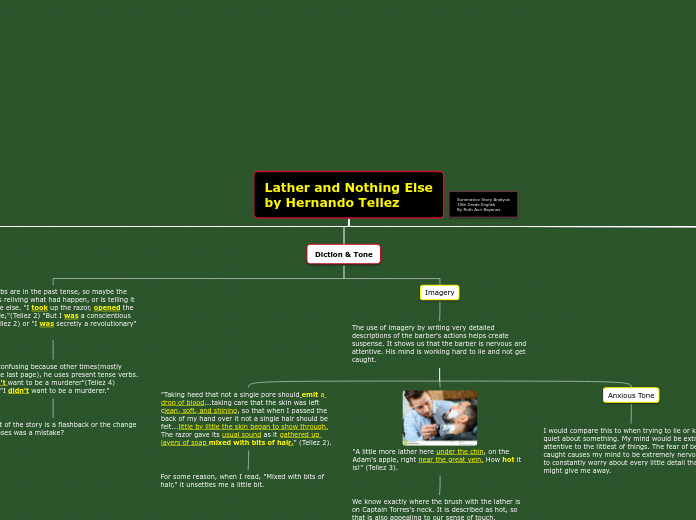by Bayanos Ruth Ann 3 years ago
1178
Lather and Nothing Else by Hernando Tellez

by Bayanos Ruth Ann 3 years ago
1178

Another example of an English translation is a more word for word translation(Linked).
Comparison
"No saludó al entrar," (Original Spanish translation). "He did not salute upon entering," (google translated).
"He came in without a word," (used in class).
"He did not say hello when he came in," (closer to word for word English translation).
Relating to the past two years, people I know and myself have lost multiple people. Earlier this year, a cluster of people I've been close with including my grandmother passed away in a short time frame. At some point, I didn't what to feel. There was just, nothing.
He also thinks about what kind of hairstyle would suit him. It could be a way of distracting himself from what he plans to do, or maybe even though he feels he is responsible to kill the Captain, he just inherently does not want to so he is thinking about what future hairstyles the captain could sport after letting him go. "He should let it grow like some poets, or some priests. It would suit him well"(Tellez 3).
With soldiers who've fought in war and part of their job is to kill people on the other side during war. Even if they aren't taken as prisoners, how could they ever go back to living normally? In this world, killing is usually regarded as one of the most monstrous and immoral crimes. "But it's not easy to kill"(Tellez 4). Even if they aren't being hunted down, their experiences will forever haunt and chase after them. Their memories of war and seeing so much bloodshed will always follow until they caught up with them. Even if they don't confront or properly process what they've seen, it will always affect them.
In the end, he chose neither to be a murdered or hero, but to just be a barber. "I am only a barber. Each one to his job. That's it" (Tellez 4).
Anxious Tone
I would compare this to when trying to lie or keep quiet about something. My mind would be extremely attentive to the littlest of things. The fear of being caught causes my mind to be extremely nervous and to constantly worry about every little detail that might give me away.
"A little more lather here under the chin, on the Adam's apple, right near the great vein. How hot it is!" (Tellez 3).
We know exactly where the brush with the lather is on Captain Torres's neck. It is described as hot, so that is also appealing to our sense of touch.
"Taking heed that not a single pore should emit a drop of blood...taking care that the skin was left clean, soft, and shining, so that when I passed the back of my hand over it not a single hair should be felt...little by little the skin began to show through. The razor gave its usual sound as it gathered up layers of soap mixed with bits of hair," (Tellez 2).
For some reason, when I read, "Mixed with bits of hair," it unsettles me a little bit.
Maybe part of the story is a flashback or the change in verb tenses was a mistake?
They aren't each other's personal enemies, but they are both for opposing views and are on opposite teams.
Even with the plan of killing the Captain, the barber decides to finish his job first. "I would have to shave his beard just like any other, carefully, neatly, just as though he were a good customer"(Tellez 2). He could have killed Captain Torres right away. Whether it was a way to delay the act or not, he decided to do what he was requested of his job. "
Captain Torres does not kill the barber even with the knowledge that he isn't on the side of their regime.
Towards the end, the barber is reminded of how skilled he is as a barber looking at how well he has shaved Captain Torres. I think this might have also influenced his decision on not being the one to kill him along with his morals.
His thoughts might also be filled with regret and guilt. Maybe from his point of view, we would get a run down on the amount of people he has executed and he decides to go to the barber to see if karma will deal with him.